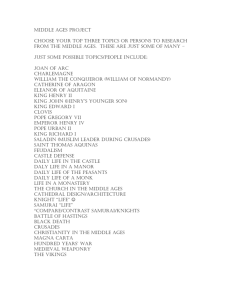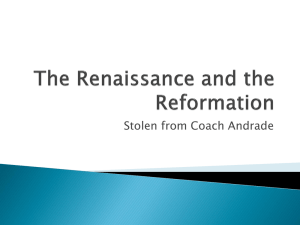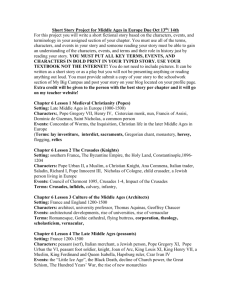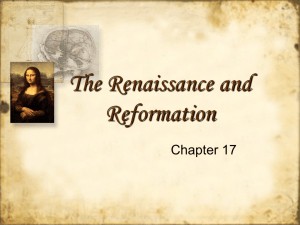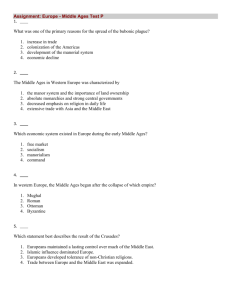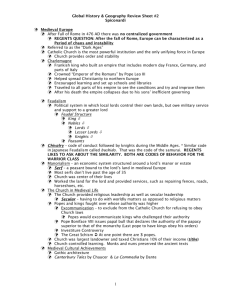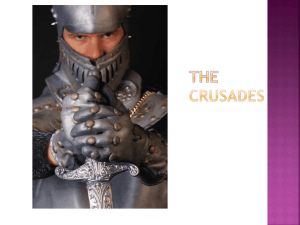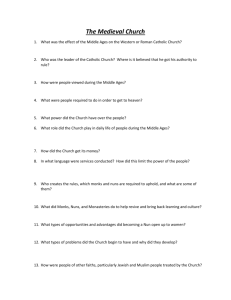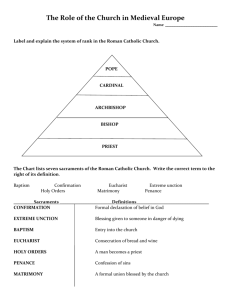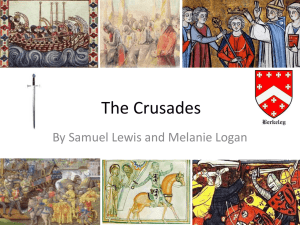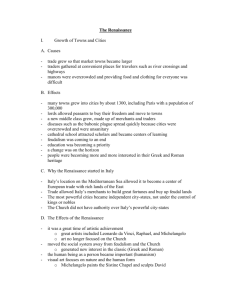Final Exam Review completed
advertisement
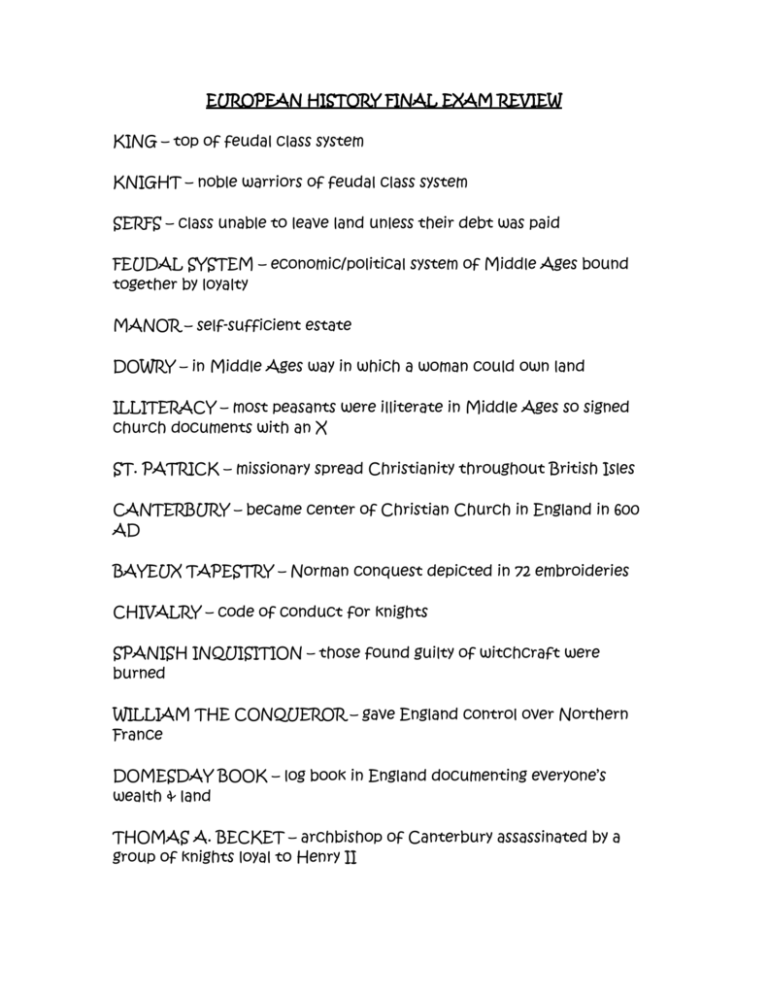
EUROPEAN HISTORY FINAL EXAM REVIEW KING – top of feudal class system KNIGHT – noble warriors of feudal class system SERFS – class unable to leave land unless their debt was paid FEUDAL SYSTEM – economic/political system of Middle Ages bound together by loyalty MANOR – self-sufficient estate DOWRY – in Middle Ages way in which a woman could own land ILLITERACY – most peasants were illiterate in Middle Ages so signed church documents with an X ST. PATRICK – missionary spread Christianity throughout British Isles CANTERBURY – became center of Christian Church in England in 600 AD BAYEUX TAPESTRY – Norman conquest depicted in 72 embroideries CHIVALRY – code of conduct for knights SPANISH INQUISITION – those found guilty of witchcraft were burned WILLIAM THE CONQUEROR – gave England control over Northern France DOMESDAY BOOK – log book in England documenting everyone’s wealth & land THOMAS A. BECKET – archbishop of Canterbury assassinated by a group of knights loyal to Henry II ELEANOR OF AQUITAINE – Henry II’s wife; how Henry II acquired Aquitaine & Gascony in northern France RICHARD I – succeeded Henry II and known for his Crusades & numerous wars MAGNA CARTA – document written in 1215 protecting the rights & liberties of the nobles; “The Great Charter” OTTO I – ruler who began the German family line of monarchs HOLY ROMAN EMPIRE – consisted of Germany & northern Italy at the turn of the century DIET OF WORMS – met in 1122 to discuss lay investiture POPE URBAN II – pope responsible for calling for the Crusades CRUSADES – set of religious holy wars tried to recapture the Holy lands in Middle East; symbol of Crusades was a cross; only one was successful SALADIN – Muslim leader who provoked the Third Crusade by capturing Jerusalem FREDERICK BARBAROSSA – on his way to the Holy Land during the Crusades but drowned so he never made it JIHAD – Muslim holy war DIET – commonly used term for a government assembly TOLLS – merchants travelling during the Middle Ages were forced to pay these at each new kingdom SILK ROAD – most commonly used roadway for people to trade from Europe to Asia during Middle Ages VIKINGS – 1000 AD they were most responsible for trading in the North FLANDERS – region in northern France known for is wool production HANSEATIC LEAGUE – created by 70 cities that joined together to change dangerous and difficult condition in northern Europe CHAMPAGNE (NOT THE DRINK) – largest fair in Europe was held in this city BARTER SYSTEM – every region had its own currency so no money was used to change hands; form of payment DOMESTIC SYSTEM – with an advancing wool industry people began making products at home MONEY CHANGER – this job was created because the regions had different types of currency GUILDS – association of merchants when they joined together MONASTERIES – schools of the Middle Ages before there were actual schools ST THOMAS AQUINAS – wrote Summa Theologica which serves as basis for teaching theology today DANTE – author of the Divine Comedy CHAUCER – wrote Canterbury Tales about a pilgrimage travelling to shrine of Thomas A. Beckett APPRENTICE SYSTEM – how a young boy learns a craft CRAFT GUILDS – created to set hours, regulate wages and set sale prices of a product BOURGEOISE – class that emerged at end of Middle Ages at the same time cities emerged; the middle class HUNDRED YEARS WAR – war fought between France & England for over 100 years; new invention of the longbow was used; France won back most of its land except Calais where the English held a fort for 200 years WAR OF THE ROSES – name given to England’s civil war that emerged after the Hundred Years War YORKISTS – wore WHITE rose during War of Roses LANCASTRIANS – wore RED rose during War of Roses; won the war HENRY VII – began Tudor dynasty; combined the roses; emerged as England’s leader at end of civil war JOAN OF ARC – French peasant girl who fought in Hundred Years War because God told her to; she was burned at the stake at the hands of the English ESTATES-GENERAL – representative assembly established in France by King Philip IV; made up of the three social classes of France PHILIP IV – King of France who set up the Estates-General, France’s first representative assembly; held no real power other than to advise the king who made all final decision (absolute monarchy); reconvened periodically throughout 1600s and instrumental in ending absolute monarchy in France during French Revolution (1789); disassembled after French Revolution FIRST ESTATE – clergy & religious leaders SECOND ESTATE – nobility/aristocracy THIRD ESTATE - townspeople GREAT SCHISM – in 1370s there were two popes to the Catholic Church one French & one Roman RENAISSANCE – rebirth or reawakening; began in northern Italy in 1350; Byzantines preserved the Greek & Roman classics studied during the period; people were most interested in the classics from Ancient Greece and Ancient Rome (Humanism movement); could not have occurred without the support of patrons GUTENBERG – invented the printed press which helped increase literacy; the Bible was the most printed book THOMAS MORE – Utopia; a book about an ideal society that exists nowhere SHAKESPEARE – greatest English playwright ERASMUS – In Praise of Folly, great humanist in northern Europe MICHELANGELO – created the Sistine Chapel BOTTICELLI – created the Birth of Venus DA VINCI – Renaissance man because he was well-rounded in many different avenues CERVANTES – Spanish Renaissance writer who wrote Don Quixote a satire on the chivalry of medieval knights MACHIAVELLI – wrote the Prince a handbook on how to succeed in politics; he dedicated it to de Medici DE MEDICI – family of Florentine statesmen, patrons of the arts, the Prince was written for him PETRARCH – Italian writer pioneer of Humanism FRESCO – painting on wet plaster; Michelangelo’s Sistine Chapel PERSPECTIVE – Renaissance artists used this technique to create the illusion of depth on a flat canvas REFORMATION – changes to the Catholic Church inspired by the Renaissance WYCLIFF – English reformer 200 years before Reformation; one of most outspoken people against the practices of the Catholic Church LUTHER – biggest complaint was sale of indulgences; believed people should interpret Bible for themselves SALE OF INDULGENCES – Luther’s biggest criticism of the Church; paying for forgiveness of sins; listed his complaints on 95 thesis PEACE AT AUGSBURG – Lutherans won the right to practice their religion; ended wars between Lutherans & Holy Roman Empire CALVIN – Reformation supporter; believed in predestination PREDESTINATION – there is no free will, our fates are already predetermined for us HUGUENOTS – followers of Calvin in France; French Protestants/Calvinists HENRY VIII – King of England; broke away from Catholic Church because pope wouldn’t grant him a divorce; created his own Protestant Church of England – the Anglican Church ANGLICAN – Church of England created under Henry VIII; Protestant INDEX – list of books people were not allowed to read because the Catholic Church decreed it so COUNCIL OF TRENT – part of Counter Reformation; document stated Pope was highest & final authority in church PURITANS – fled to the Americas for religious freedom EXPLORATION – reasons for exploration in 15th-17th centuries – Gold God Glory; gain wealth, establish trade, set up colonies SCURVY – disease caused the death of many sailors at sea COLUMBUS – sailed for Portugal; he died believing he reached the West Indies DIAZ – first sailor to reach the Cape of Good Hope VESPUCCI – his first name was used to label North America MAGELLAN – his crew was the first to circumnavigate the globe; he died en route BALBOA – first to cross the Isthmus of Panama DA GAMA – first to sail around Africa & land in Asia PONCE DE LEON – responsible for giving Florida its name BLACK DEATH – nursery rhyme “Ring Around the Rosie” was originally written to describe the death associated with the Black Death/Bubonic Plague
